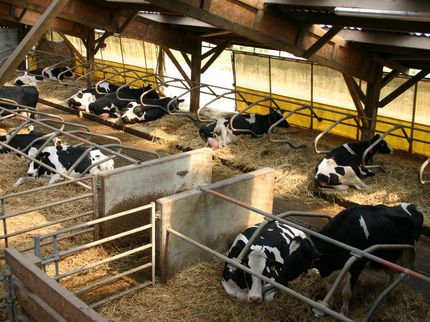New method to measure milk components has potential to improve dairy sustainability
Journal of Dairy Science® reports development of a modified milk calibration sample set to improve accuracy of milk urea nitrogen testing
Present in blood, urine, and milk, the chemical compound urea is the primary form of nitrogen excretion in mammals. Testing for urea levels in dairy cows helps scientists and farmers understand how effectively nitrogen from feed is used in cows' bodies, with important economic implications for farmers in terms of feed costs, physiological effects for cows such as reproductive performance, and environmental impacts from excretion of nitrogen in dairy cow waste. Thus, accuracy in testing dairy cow urea levels is essential.

unsplash
Since the 1990s, mid-infrared testing of milk urea nitrogen (MUN) has been the most efficient and least invasive way to measure nitrogen use by dairy cows in large numbers. In a recent article in the Journal of Dairy Science, researchers from Cornell University report the development of a robust new set of MUN calibration reference samples to improve accuracy of MUN measurement.
"When a set of these samples has been run on a milk analyzer, the data can be used to detect specific deficiencies in the quality of the MUN prediction that might be corrected by the instrument user or the milk analyzer manufacturer," explained senior author David M. Barbano, PhD, Northeast Dairy Foods Research Center, Department of Food Science, Cornell University, Ithaca, NY, USA. Accurate and timely MUN concentration information "is of great importance for dairy herd feeding and reproduction management," Barbano added.
Given increasing worldwide scrutiny of the environmental effects of large-scale agriculture and the economic challenges faced by farmers, the need for accurate understanding of nitrogen use in the dairy industry has perhaps never been more pressing. This improvement in milk component testing marks further progress toward healthier and more sustainable agricultural and food production practices that will benefit producers and consumers alike.
Original publication
Most read news
Original publication
Topics
Organizations
Other news from the department science

Get the food & beverage industry in your inbox
By submitting this form you agree that LUMITOS AG will send you the newsletter(s) selected above by email. Your data will not be passed on to third parties. Your data will be stored and processed in accordance with our data protection regulations. LUMITOS may contact you by email for the purpose of advertising or market and opinion surveys. You can revoke your consent at any time without giving reasons to LUMITOS AG, Ernst-Augustin-Str. 2, 12489 Berlin, Germany or by e-mail at revoke@lumitos.com with effect for the future. In addition, each email contains a link to unsubscribe from the corresponding newsletter.



























































